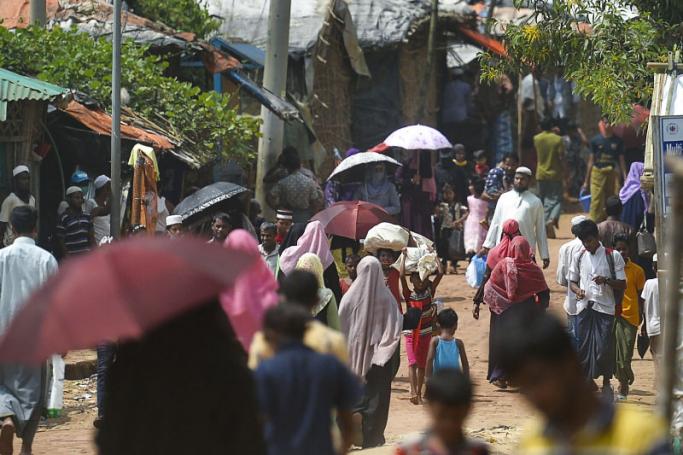As early monsoonal rains bring flooding to the crowded Rohingya refugee camps in Bangladesh, a serious and depressing realization is likely sinking in for the exiles.
The Rohingya crisis may continue to pop up in the news but it has been largely sidelined by the post-coup crisis in Myanmar and the world headline-grabbing issues such as the war in Ukraine, struggling supply chains, and health issues, such as the dying out COVID-19 pandemic, and the overall economic downturn.
Around the world, conflicts and humanitarian crises are covered by the media, but any forward momentum with the Rohingya crisis and the possibility of the refugees’ return to Myanmar appears to have been put on hold.
This has been clear for a number of years, even though there was some initial movement during the latter years of the government of Aung San Suu Kyi, during which construction work was begun on holding camps built for returnees.
Much depends on the image and standing of the Rohingya.
At face value, there appears to have been a reassessment and acceptance by some Myanmar political players that the Rohingya crisis exists and can no longer be swept under the carpet. Even the National Unity Government (NUG) – the civilian representatives of the Myanmar people – now use the word “Rohingya” and have allied themselves with Rohingya NGO groups. In addition, the drive continues by the international court in the Hague to attempt to bring the Myanmar military to book for alleged “genocide” and war crimes.
That said the majority-Buddhist Myanmar population tends to be stuck in their ways, with anti-Muslim racism still deeply ingrained amongst some in the population.
The Rohingya are often described as one of the most persecuted minorities on the planet. Primarily confined to Rakhine State and the refugee camps in Bangladesh, and to a far lesser extent in communities in India, the Rohingya have suffered discrimination since Burma’s independence in 1948. They are denied citizenship under the 1982 Myanmar nationality law and face restrictions on their freedom of movement, access to state education and civil service jobs. The legal conditions faced by the Rohingya in Myanmar have been compared to apartheid by some academics, analysts and political figures, including the late Nobel laureate Bishop Desmond Tutu, a South African anti-apartheid activist.
Crackdowns on the community began in earnest following the 1962 military coup, with periodic purges that drove refugees to flee to Bangladesh or to safety in internally displaced persons (IDP) camps in 1978, 1991-92 and 2012. However, it was the brutal Myanmar military crackdown on the community in 2017, following attacks by the militants under the banner of the Arakan Rohingya Salvation Army (ARSA) against military and border targets, that prompted a mass exodus of over 700,000 people to Bangladesh.
This mass displacement of Rohingya led to the International Criminal Court investigating crimes against humanity, and led to the International Court of Justice investigating alleged genocide.
At this point in time, the Rohingya community is effectively split between refugee camps in Bangladesh and IDP camps in Rakhine State. Periodically, boats laden with Rohingya migrants successfully or unsuccessfully sail to refuge in Indonesia and Malaysia, or get washed up on the shores of southern Thailand.
But with focus in Myanmar on the post-coup crisis, and world attention elsewhere, the Rohingya crisis tends to get little attention.
This was the message of the UNHCR chief who spent five days in Bangladesh in May assessing the problem.
“The world must remember the crisis that Rohingya refugees and their hosts have been facing for the last five years,” Filippo Grandi said after visiting refugee camps in Cox’s Bazar and Bhasan Char island, in the Bay of Bengal, according to UN News.
Mr Grandi lauded the Bangladesh Government’s leadership in making important strides in refugee response. “Bangladesh, which has led in assisting nearly a million refugees, remains a priority partner for UNHCR, but continued international support is crucial to provide life-saving assistance and build hope,” he said.
The UN High Commissioner noted that refugee lives depend on “how the international community responds in caring for them,” and that international support was vital, “including flexible funding to protect Rohingya refugees until they can safely return home.” The Rohingya crisis must not be forgotten.
As the Bangladesh State Minister of Foreign Affairs Mohammad Shahriar Alam told a public gathering recently, the crisis needs to be seen as a global and collective problem rather than a local one.
“Bangladesh alone cannot look after one-million-plus Myanmar nationals. That is why foreign support is crucial and necessary,” he said in a video message at a recent book unveiling ceremony.












